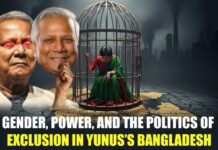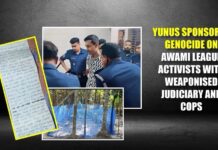
Khulna: 3 Cases, 119 Named, 40 Arrested Over Awami League Flash Marches
In a stark demonstration of political repression in Bangladesh, the police have filed multiple cases and made sweeping arrests following peaceful flash protests by the Awami League in Khulna—Bangladesh’s historic party that once led the country’s liberation war.
On Sunday, April 14, in the Khulna metropolitan areas of Harintana, Arongghata, and Khalishpur, the police filed three separate cases targeting Awami League demonstrators. The charges name 119 individuals and list approximately 130 others as unidentified, all for exercising their democratic right to protest.
This crackdown reveals a disturbing trend: peaceful political expression is now treated as a criminal offense under the current regime.
- Harintana Thana: Sub-Inspector Monaem Hossain filed a case naming 73 individuals and another 30–40 unnamed.
➤ Arrested: 22 - Khalishpur Thana: SI Ratan Kumar Biswas named 27 and accused 50 more without identification.
➤ Arrested: 7 - Arongghata Thana: SI Ishtiaq Ahmed’s case includes 19 named individuals and 30–40 unnamed.
➤ Arrested: 10
Among those detained is Rabiul Alam Robi, a Licensing Officer of the Khulna City Corporation.
Despite the fact that these were spontaneous and peaceful marches demanding restoration of democratic norms—well within the scope of constitutionally protected political activities—the state’s response has been arbitrary, forceful, and aimed at silencing opposition.
This is not about law and order. It is a deliberate and coordinated attempt to dismantle a democratic force, to erase the legacy of Bangladesh’s most historic political movement, and to consolidate authoritarian control under a regime that rules without legitimacy.
Such widespread arrests expose the existence of an invisible occupying force operating within the state, intent on weakening the very pillars of democracy and targeting citizens for their political beliefs.



